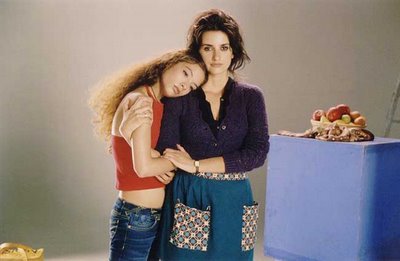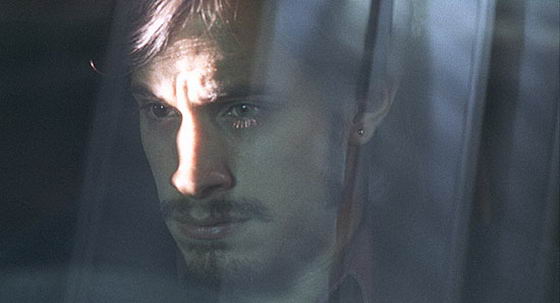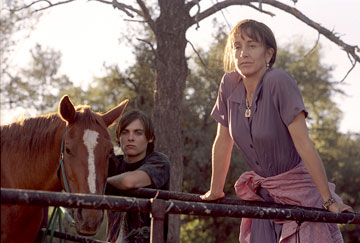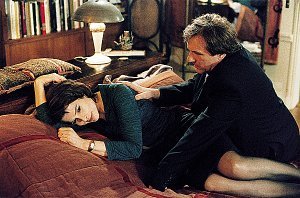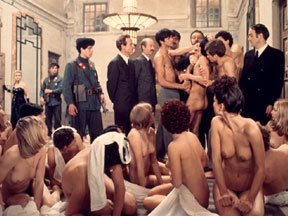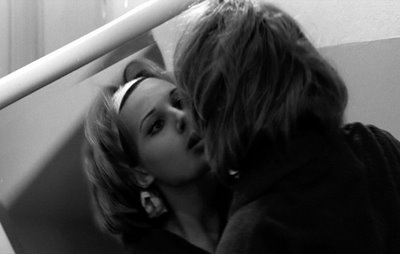 Romance
Romance - dir. Catherine Breillat - 1999 - France
If you were keeping tabs on the history of the recent European (and American, if you count
The Brown Bunny) trend of unsimulated sex in film, you'll find Romance at the beginning of your list. Surely, it's not the first film to have done such a thing, but it certainly started a trend, whether Catherine Breillat meant to or not. Back in 1999, Romance was a hot ticket. Intellectuals could get the rocks off without feeling smutty and look completely sophisticated for appreciating a film of this nature. "It's like
Last Tango in Paris for the end of the century, only they really fuck!" (Coincidentally, Breillat has a small role in that film) There was a backlash too. As I was under 17 at the time, I wasn't allowed in the theatre, so I had to rely on my friends' testimonies to form an opinion. A lot of them were turned off by the film's coldness, while others laughed at the metaphor of a penis to a bird. Either way, I was clouded with negativity before even seeing it. When I actually did, I think I found it as silly as my older friends, but how does a sixteen year old begin to relate with a Catherine Breillat film? Now that I'm older (and hopefully wiser), have a lot more film experience under my belt, and an understanding of Breillat's other work (namely
Fat Girl and
Anatomy of Hell) and the trend I spoke of earlier, I thought it was about time to revisit
Romance.

Sure, the bird metaphor that Marie (Caroline Ducey) uses while holding her boyfriend's dick is a bit silly, but I hardly found it as silly as I did as a sensitive teenager. What Breillat presents is not simply an intellectual's porn film, stimulating the mind instead of the libido. She doesn't replace facials and double-penetration with thoughts on gender and sexuality. What she has to say is important... no matter how you feel about her work, her resounding voice demands respect. Yet what bothered me about
Romance this time around is what bothers me about most play-to-film adaptations. Breillat has a fairly extensive background in literature; she wrote her first novel, entitled
L'Homme facile (
The Easy Man), at the age of seventeen. She also co-wrote the screenplays for several respectable directors like Liliana Cavani (
La Pelle), Maurice Pialat (
Police), and even Federico Fellini (
...And the Ship Sails On), in addition to writing novels and adapting them into films. She adapted her novel
Le Soupirail into
Une Vraie jeune fille (
A Real Young Girl) into a film in the mid-70s (though it was banned in France until just a few years ago), as well as
36 fillette in 1989, yet it probably wasn't until
Romance came out that Catherine Breillat was ever considered "important" in the film world. She became "important" because she demanded importance. Her films were not going to go unnoticed, and from then on, they didn't, and perhaps this has most to do with the graphic sex, but I doubt that was Breillat's point.
 Romance
Romance remains a failure though because it doesn't lend well to film. This is probably best explained in contrast to
Fat Girl and
Anatomy of Hell, which is why I'm glad to have rewatched it after having a better understanding of Breillat's work. To say that
Romance doesn't lend well to film is not to bare my secret prudishness, for that isn't true; it's meant to express my doubts toward Breillat as a filmmaker at this point in her career. The visual medium can be tricky for those trained in the written word.
Romance falls somewhere between
Fat Girl and
Anatomy of Hell in narrative.
Fat Girl follows a more tradiontal structure, in which characters are exactly that. She infuses philosophy and thought into the story of the two sisters. In
Anatomy of Hell, her characters don't even have names. It's meta to the fullest, and it helps that she cast a Gucci model and a porn star as her central figures.
Romance is a semi-narrative about a woman, Marie, and her search for sexual gratification as her boyfriend Paul (Sagamore Stévenin) has lost interest in her sexually. The narrative is cut by Marie's interior monologue about obscenity and degradation. Her sexual encounters range from a well-endowed widower (Rocco Siffridi) to her boss (François Berléand) who likes to tie her up. Marie is given a name, an occupation (she's a school-teacher), and Breillat gives us her thoughts. Yet, at the same time, she is meant to represent a larger scale of women, sexually unsatisfied and denied of their urges. This is not a successful union, as Breillat allows for the viewer to become somewhat attatched to her instead of letting her stand as a theory itself.
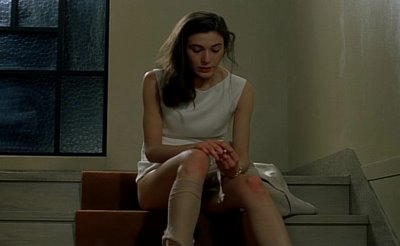
As for the visual nature of the film, Breillat's literary background hinders a greater appreciation again. While certain films (Bergman's
Cries and Whispers comes to mind) use the color scheme to aid in mood, Breillat's knack for color comes off as annoyingly evident here. While the colorless white of
Anatomy of Hell works perfectly for the film, it does not here. In Paul's apartment, the decor is minimal, all white or blanched; he is only seen wearing white or the palest of tan, just as Marie appears to be draped in white throughout most of the film. Get it... white is the color of virginity. When the change in color finally arrives, we saw it coming two reels ago. And, of course, it had to be red. Fire, passion! Her use of red and white seems rather textbook and painfully obtuse.

Breillat's intellect makes it truly difficult to outright dismiss
Romance. She really has a voice of her own, and not one that's heard very often in the realm of cinema. Post-
Romance, she's really hit her stride. However, as a film, it's also difficult to applaud her. The deconstruction theory of sexuality and femininity does not translate well here. Yet, further still, her ability to provoke (though
provocateuse is probably too harsh a word to describe Breillat) and stimulate must be recognized. Breillat demands it. To discuss the nature of unsimulated sex onscreen would take a whole 'nother blog (or, better yet, a thesis paper), so I shall save that for another day.
Romance will always have its place in the film history books, if only briefly mentioned after a passage about Larry Clark. But there is where a grave distinction between filmmaker and provocateur needs to be drawn.
 The obvious answer is "no," Cannes is not nearly as awful at the Academy Awards -- after all, I don't think Crash was ever in competition there. However, I can't say some of the more recent Palme d'Or winners don't have something in common with those Best Picture Oscar winners, in that they'll probably all be forgotten in ten years. This is hardly a criticism of this year's awards ceremony, as I've seen none of the films yet, but, really, who got super excited when they heard the new Ken Loach film won the Palme d'Or? Certainly not me. In the past seven or so years, the Cannes jury have been leaning toward political films and subdued (read: boring) neo-realist films. The only two American films to go home with the Palme d'Or since the mid-90s were hot button-pushers (Gus Van Sant's Elephant, Michael Moore's Fahrenheit 9/11). This year we've got a period piece about politics in 1920s Ireland, which teams well with Roman Polanski's win for The Pianist in 2002. And, of course, we have the Belgian Dardenne brothers, who won last year with L'Enfant and in 1999 with Rosetta, both nicely paired with Nanni Moretti's "human drama" The Son's Room (La stanza del figlio), a trio of films so quiet they were barely remembered by the time they even got to the United States. And then, of course, there's Lars von Trier's Dancer in the Dark, a film that doesn't appear to fit with these boring Cannes trends, but maybe the jury, lead by (groan) Luc Besson that year, mistakenly took the film for a a stark drama/political statement on immigration in America instead of the absurdist musical melodrama snuff flick it really is.
The obvious answer is "no," Cannes is not nearly as awful at the Academy Awards -- after all, I don't think Crash was ever in competition there. However, I can't say some of the more recent Palme d'Or winners don't have something in common with those Best Picture Oscar winners, in that they'll probably all be forgotten in ten years. This is hardly a criticism of this year's awards ceremony, as I've seen none of the films yet, but, really, who got super excited when they heard the new Ken Loach film won the Palme d'Or? Certainly not me. In the past seven or so years, the Cannes jury have been leaning toward political films and subdued (read: boring) neo-realist films. The only two American films to go home with the Palme d'Or since the mid-90s were hot button-pushers (Gus Van Sant's Elephant, Michael Moore's Fahrenheit 9/11). This year we've got a period piece about politics in 1920s Ireland, which teams well with Roman Polanski's win for The Pianist in 2002. And, of course, we have the Belgian Dardenne brothers, who won last year with L'Enfant and in 1999 with Rosetta, both nicely paired with Nanni Moretti's "human drama" The Son's Room (La stanza del figlio), a trio of films so quiet they were barely remembered by the time they even got to the United States. And then, of course, there's Lars von Trier's Dancer in the Dark, a film that doesn't appear to fit with these boring Cannes trends, but maybe the jury, lead by (groan) Luc Besson that year, mistakenly took the film for a a stark drama/political statement on immigration in America instead of the absurdist musical melodrama snuff flick it really is. I suppose I just find it strange to see a film like Rosetta or Elephant taking top honors in recent years alongside previous winners like Antonioni's Blow-Up, Coppola's Apocalypse Now, Demy's The Umbrellas of Cherbourg (Les parapluies de Cherbourg), Carol Reed's The Third Man, or Fellini's La dolce vita. Then again, I suppose it's much simpler judging things as time had passed. For all the Cannes jury knew at the time, maybe La dolce vita would be as quickly forgotten as The Son's Room. I suppose also that I'm looking at some of the greatest hits of the festival; I mean, you've seen the 1962 winner O Pagador de Promessas (Payer of Promises), right? Oh, maybe not. I had the scary thought in my mind that maybe there's nothing wrong with the Cannes jury, and maybe it's just cinema that's getting continuously shittier as time goes on. I wiped my brow shortly after that thought and remembered that we can still look forward to the always sure-to-be-challenging works of nouveau auteurs like Michael Haneke, Pedro Almodóvar, Lars von Trier, etc. I guess I should just quit bitching; you'd rather see a neo-realist drama take the top prize than some Russell Crowe/Ron Howard flick, right?
I suppose I just find it strange to see a film like Rosetta or Elephant taking top honors in recent years alongside previous winners like Antonioni's Blow-Up, Coppola's Apocalypse Now, Demy's The Umbrellas of Cherbourg (Les parapluies de Cherbourg), Carol Reed's The Third Man, or Fellini's La dolce vita. Then again, I suppose it's much simpler judging things as time had passed. For all the Cannes jury knew at the time, maybe La dolce vita would be as quickly forgotten as The Son's Room. I suppose also that I'm looking at some of the greatest hits of the festival; I mean, you've seen the 1962 winner O Pagador de Promessas (Payer of Promises), right? Oh, maybe not. I had the scary thought in my mind that maybe there's nothing wrong with the Cannes jury, and maybe it's just cinema that's getting continuously shittier as time goes on. I wiped my brow shortly after that thought and remembered that we can still look forward to the always sure-to-be-challenging works of nouveau auteurs like Michael Haneke, Pedro Almodóvar, Lars von Trier, etc. I guess I should just quit bitching; you'd rather see a neo-realist drama take the top prize than some Russell Crowe/Ron Howard flick, right?







